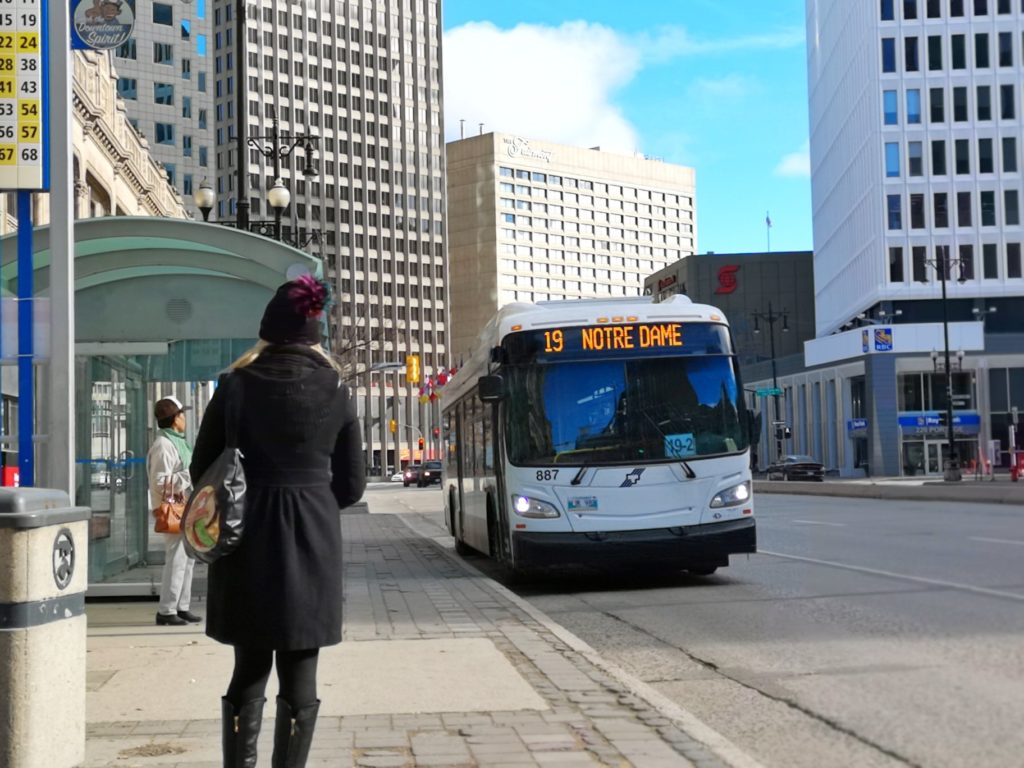
Winnipeggers are preparing to elect a new mayor and city council this fall. As advocates for a better public transit system, Functional Transit Winnipeg (FTW) is calling on all candidates to fully support the new Winnipeg Transit Master Plan, which promises to dramatically improve service for riders across the city.
The TMP is the result of years of hard work by FTW in partnership with city officials, politicians, and other civic organizations. While the current city council has committed to implementing the plan, that can change after the election. A new mayor and city council can shift priorities, or scrap it all together. We can’t let that happen!
Add your voice to our petition calling on all candidates to fully support implementing Winnipeg’s new Transit Master Plan, and build a more frequent, affordable and accessible transit system!
The TMP includes a frequent service network, which would introduce 15 minute service to major routes across the city, and improve feeder service during the day, evenings, and weekends. Moreover, the TMP would increase the percentage of households within 500m of frequent service by 37% — 21% of households are currently within 500m, while TMP promises to increase that to 58%!
The TMP means shortened commutes, easier access to routes that come often, and easier trips that don’t require scheduling and planning!
Election Day is October 26, 2022. Make your voice heard today!
Fast Facts about the Transit Master Plan
Funding the Winnipeg Transit Master Plan will ensure 58% of Winnipeg homes are within 500m of a frequent service stop.
As we face environmental, infrastructure and challenges with affordable transportation, we call on the Winnipeg City Council to implement the Winnipeg Transit Master plan. Years of consultation and research went into this plan. It is fiscally responsible, based on best practices, and reflects what riders want.
In 2020, council approved a new Transit Master Plan which would:
- redesign the whole system from scratch,
- eliminate windy and inefficient routes,
- create high-frequency routes on existing roads, and
- ensure 58% of homes are within 500m of a stop with frequent (15 mins) service, from the current 21%
The entire proposed overhaul of the Winnipeg Transit system, with high-frequency lines to all corners of the city, could cost less than the southwest Blue Line transitway alone. The federal government has committed to funding 40% of transit infrastructure projects.
The City of Winnipeg spends less on its transit per passenger than any other Canadian city except Toronto, yet every dollar invested in public transit provides $4-$5 in return in cost savings and economic opportunities, making it the most cost-effective infrastructure investment.
What will we get from a Frequent Service network?
Empower more Winnipeggers to commute and travel affordably
Gas prices are at previously unseen highs, and likely we will need to adjust to a new, pricier, normal. Likewise, since the start of the pandemic, both new and used vehicle purchase prices have been breaking records. As of 2017, Manitoban households already spent an average of 20.2% of household income on transportation.
Conversely, each family that gets rid of one car and relies on public transit saves over $10,000 per year, and a robust transit system would improve the fortunes of many Winnipeggers, especially those who cannot drive, or cannot afford to purchase, maintain and park a vehicle.
Reduce the wear and tear on our roads
Fewer personal vehicles on the road means fewer potholes, and reduced upkeep costs over time, as well as less traffic, reducing the need for expensive and disruptive roadway expansion projects.
Reduce our CO2 emissions
Transportation accounts for a quarter of Canada’s greenhouse emissions, almost half of which comes from cars and light trucks. On average, bus transit produces just two-thirds of the CO2 emissions of private automotive transit, calculated per passenger mile. While this is important on a global scale to combat the climate crisis, this also improves our local air quality.
If we made public transit sufficiently attractive to reduce emissions from private vehicles by only 2%, it would have the same environmental impact as electrifying every transit vehicle in Canada.
Boost Local Business
Transit services can increase economic productivity by improving access to education and employment, and support businesses by increasing applicant pools and reducing absenteeism from vehicle failures.
Save lives
Using transit promotes movement — getting us important exercise in an increasingly desk-bound society. Additionally, in 2020 alone, traffic collisions took the lives of 78 Manitobans, and seriously injured over three hundred.